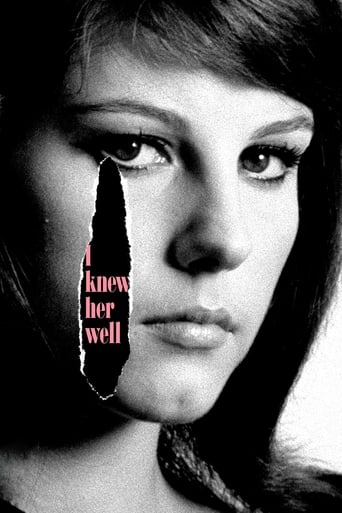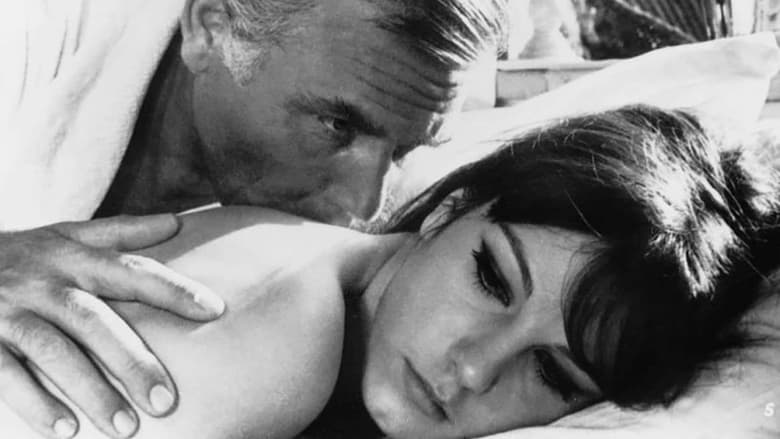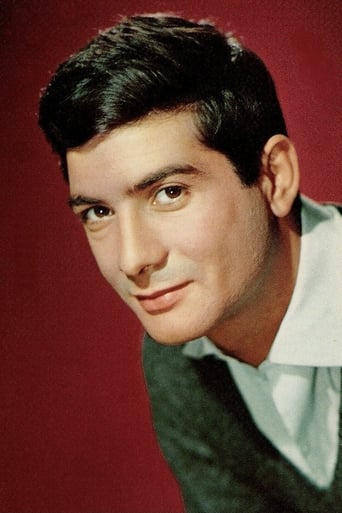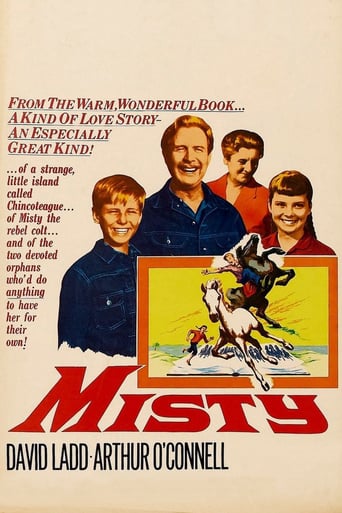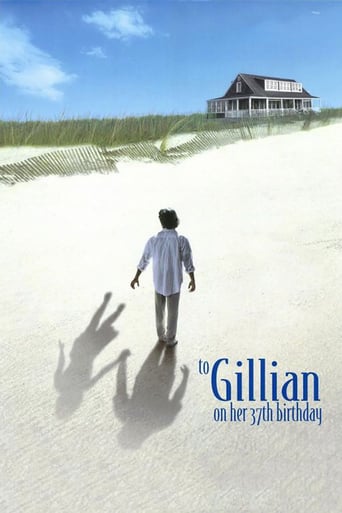I Knew Her Well (1965)
A young woman from the Italian countryside experiences the dark side of the business after she moves to Rome to become a star.
Watch Trailer
Free Trial Channels
Cast


Similar titles
Reviews
From my favorite movies..
This is a tender, generous movie that likes its characters and presents them as real people, full of flaws and strengths.
This is a small, humorous movie in some ways, but it has a huge heart. What a nice experience.
There is definitely an excellent idea hidden in the background of the film. Unfortunately, it's difficult to find it.
A definite highlight of Italian filmmaker Antonio Pietrangeli's career, on which would be tragically put a kibosh by his untimely death in 1968, in reality, people do die of drowning after falling off a cliff. I KNEW HER WELL continues his streak of strong female presentation, first and foremost, it is a story about a prelapsarian countryside Italian girl Adriana (a 19-year-old Sandrelli uncannily likens a luscious Taylor Swift), who jauntily pursues her star-making dream in the capital city. Pietrangeli and his co-writers configure a loosely chronological and episodic narrative detailing the interactions between Adriana and a smorgasbord of male characters, from boyfriends, bedfellows, exploiters to sympathetic have-nots, scathingly refracts the sprawling turpitude infesting the showbiz, that a young and unsophisticated Adriana is always given the short end of the stick, can never fall in love with the right guy, and occasional sparkling of kindness dims quickly since it is just not the right time, and the film's ostensibly disengaged observation gives way to an abrupt kicker in the end, where a dysphoria-stricken Adriana takes a radical step to purge her profound disillusion out of her existence. Wonderfully concatenating manifold vignettes into a cogent case study pertaining to the disintegration of a starlet-to-be's pipe dream (often meld perfectly with era-specific tuneage and dancing routines), Pietrangeli enlists a swell group of multi-national supporting actors, natives Manfredi (unscrupulous), Salerno (pompous), Fabrizi (smarmy), Nero (four-square), joined by a French (Brialy), a German (Fuchsberger), an Austrian (Hoffman) and a Swiss (Adorf) to bolster the mainstay, among whom, Ugo Tagnazzi brilliantly steals the limelight with his backbreaking tap dance and abjectly obsequious attitude as a struggling has-been.As our leading lady, Sandrelli is de facto a phenomenal wet-behind-the-ears ingénue, but also excels in bringing about a palpable strength of integrity and defiance that is well beyond her age, yet, more often than not, emanates a ghost of melancholia even when hijinks are in full swing. Unequivocally evokes a young girl's version of Fellini's LA DOLCE VITA, I KNEW HER WELL is an unalloyed Italian hidden gem exhumed from near obscurity with its shimmering amalgamation of vintage style, unaffected poignancy and incisive self-mockery.
Criterion Collection has released 'Io la conocevo bebe' (I knew her well) a half century after its first showing. Stefania Sandrelli carries the film admirably, with a star studded cameos of the 1960s, say Jena-Claude Brialy, Ugo Tognazzi, Joachim Fuchsberger and a young handsome Franco Nero. A poor peasant girl comes to Rome to make her fortune. She is pretty and likes to have fun. She is bait for men who use her, take her money and drop her. She pays her way with her body and her money. She works at odd jobs, but is kept by an madam of sorts in a high rent, high rise flat in Rome. Adriana surfs her own sweet life--her own dolce vita. Pietangeli the director skilfully uses the pope tunes of the day to anchor the mood and the state of Adriana's existential highs and lows. A writer played by Fuchsberger limns her character: she lives for the moment. And when she has a chance to make it, the film of her mocks her pretensions and rips her dreams through ridicule; she is mocks as someone of no education, a 20 something who goes from bed to bed and in the end aging will walk the pavement for her living. Humiliated she throws herself off her balcony as the credits roll up the screen. A morality play? Perhaps. A commentary on a youth that is not golden and knows no future but the fleeting moment of sense 'fame', if you can call it that.
Another of the many Italian movies about alienation in the post-war years, very well made, beautifully shot, often interesting - but not up there with L'AVVENTURA or LA DOLCE VITA. The problem is the main character, one of the horde of young, nouveau-American European youth of the 1960s, ignorant of the war or much else besides, who only enjoys dancing to moronic music, polishing her nails, and reading comic books. Of course, she wants to be an actress. She goes through as many hairstyles as boyfriends in the course of the film, and though among them there are some recognizable faces (Franco Nero is the shy young auto mechanic here; the following year he would be cold-blooded killer DJANGO), the hairstyles tend to be more memorable than the men.The problem with making a movie about a character as vapid as this young woman is that her story isn't compelling. Even though we find out later that she's really just a poor girl from the country from a hard-luck farm family, even though we cringe at the number of times she's exploited through the course of the film - there is one particularly cruel scene in which a young man, after sleeping with her, has her telephone the girl he really likes, just in case her mother answers - the life and death of a bubblegum-popping wannabe actress is not the stuff of great tragedy. She takes a leap just when self-awareness finally dawns: no one cares for her (except Nero's character, who she doesn't even notice), she's the butt of jokes, she really is just a beautiful idiot with no future once the looks fade. Of course, the real theme of the movie might be that thinking too much is a bad thing: in one telling sequence a jaded writer says as much to her, that her brainless, live-for-the-moment existence might be some kind of unconscious wisdom. But the life of the girl, who I suspect is a kind of symbol of the director's horror of modern Italy, grows a little tiresome before the end of the film.
"Io La Conoscevo Bene" or "I Knew Her Well" in English translation is a somewhat different film from the rest made by Antonio Pietrangeli and one of his last before his premature death. The theme of loneliness and alienation is not new in cinema,but Pietrangeli takes it from a different angle: his heroine,the naive countryside girl Adriana,who dreams of a career as a star in Rome, is not an escapist or introvert;on the contrary, she tries her best to socialize and befriend people , but the results are most disappointing and frustrating - people just ignore her, use her, make fun of her,exploit her body and her good intentions.Nobody is taking her seriously.Is it our cruel modern world's trademark?Seems to be true.INDIFFERENCE also kills. The magnificent cast of the greatest of Italian stars , each of them playing very small episodes,give distinctive CHARACTERS, blood and flesh ,to their protagonists,though their screen life lasts no more than five minutes each. The soundtrack by Piero Piccioni,like the sound of a torn string in the middle of a tune, suggests a young life broken before it has blossomed. Stefania Sandrelli, still a TEENAGER(!!) ,performs in an amazingly mature and confident way.Though she had some experience of working with great directors before (Pietro Germi), her psychological portrayal of a silly girl mesmerized by the glitter of the big city is very deep and convincing. Of course, this film was the labour of love of Antonio Pitrangeli, a very experienced director, but somewhat underrated ( nobody would put him on a pedestal alongside Fellini or Visconti).This film, undoubtedly,would make film critics and the audience reconsider the hierarchy of the Italian cinema Olympus dwellers.

